Overview
To successfully launch an online wine business, it is essential to craft a comprehensive business plan. This plan should encompass:
- Defining a clear vision
- Conducting thorough market research
- Establishing an effective marketing strategy
- Understanding the legal requirements
- Selecting an appropriate business model
- Sourcing quality wines
- Implementing strategic marketing tactics
These elements are crucial for nurturing customer relationships and ensuring sustainable growth. By addressing them, entrepreneurs can position themselves for success in the competitive wine industry.
Introduction
Embarking on an online wine business offers an exhilarating opportunity for aspiring entrepreneurs to engage with a flourishing market. With the right strategies and insights, individuals can convert their passion for wine into a thriving enterprise. Yet, the intricacies of business planning, legal obligations, and effective marketing can seem overwhelming. What essential steps can you take to not only establish a robust online presence but also secure long-term success in this competitive industry?
Develop a Comprehensive Business Plan
- Define Your Vision and Mission: Clearly articulate your objectives for the beverage business and the core values that will guide its operations. This focus will attract like-minded customers and leverage Enocap's expertise in crafting compelling brand narratives that resonate with audiences.
- Conduct Market Research: Thoroughly analyze the beverage market to uncover trends, identify target demographics, and assess competitors. Utilize this data to refine your business model and marketing strategies, aligning with direct-to-consumer approaches that foster sustainable growth.
- Outline Your Business Model: Determine whether to sell directly to consumers, through retailers, or adopt a hybrid approach. Explore options such as wine clubs, subscription services, or e-commerce platforms to understand how to start a wine business online. Enocap can support you in developing effective direct-to-consumer channels that convert casual buyers into dedicated club members.
- Financial Projections: Develop comprehensive financial forecasts, encompassing startup costs and revenue projections. A solid grasp of financial viability will attract potential investors. Enocap's strategic capital advisory services offer tailored solutions for debt, equity, or acquisition opportunities, bolstering your financial planning.
- Marketing Strategy: Formulate a marketing plan that integrates branding, promotional tactics, and client engagement strategies. Leverage your unique narrative skills to emotionally connect with clients, a crucial aspect of Enocap's strategy for enhancing winery brands.
- Operational Plan: Detail daily operations, including sourcing, production, distribution, and client service. This roadmap will ensure efficient business operations while remaining adaptable to the dynamic landscape of .
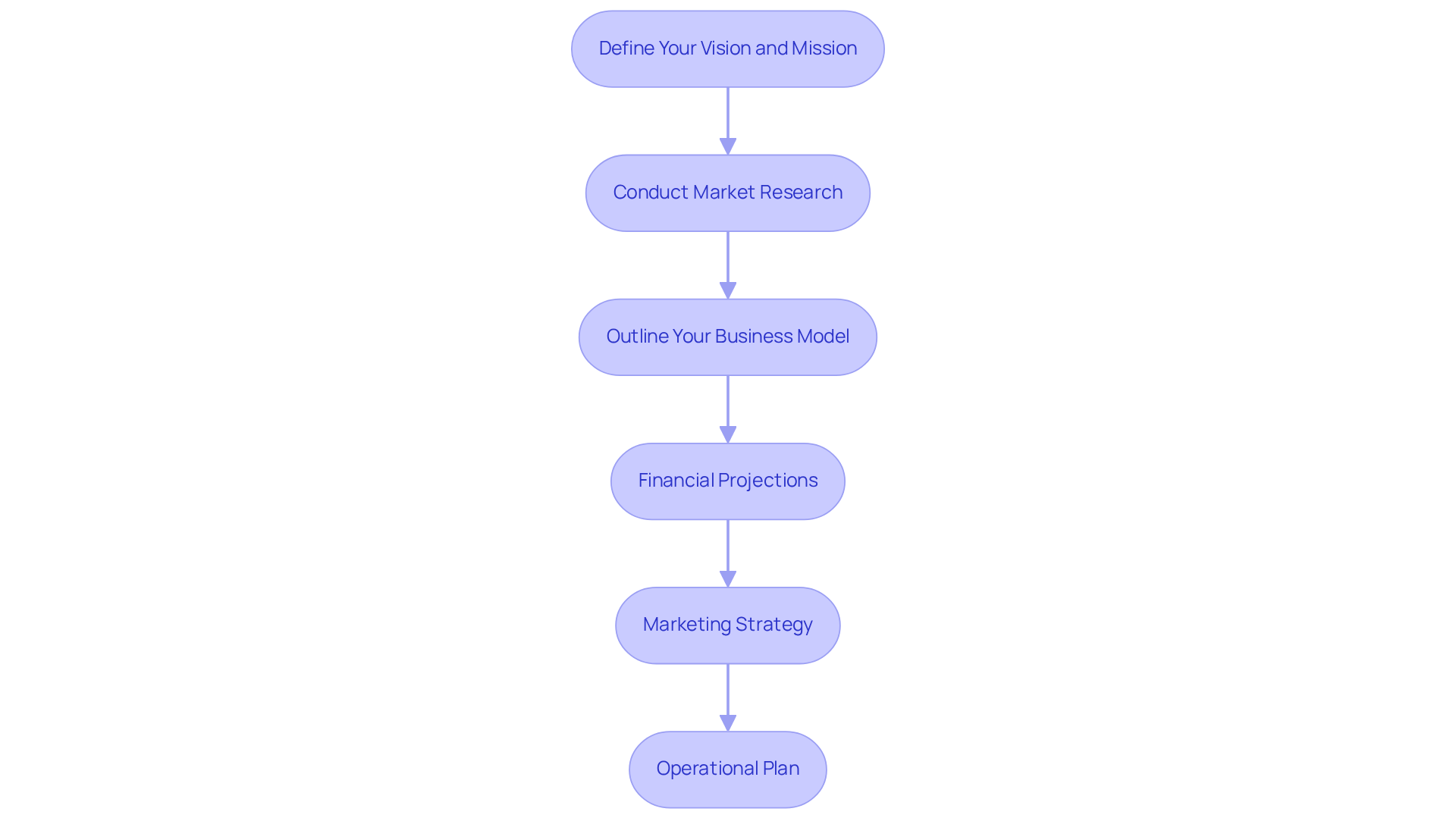
Understand Legal Requirements and Licensing
- Research Federal and State Regulations: Begin with a thorough understanding of the federal laws that govern alcohol sales, particularly the regulations set forth by the Alcohol and Tobacco Tax and Trade Bureau (TTB). It is equally important to examine the specific laws of your state, as local requirements can vary significantly.
- Obtain Necessary Licenses: Ensure you apply for all required licenses, including a federal basic permit, state liquor licenses, and any necessary local permits. If your business model includes direct sales to consumers, a retail license will also be essential.
- Adherence to Age Limitations: Implement robust age verification procedures to guarantee that alcoholic beverages are sold exclusively to individuals of legal drinking age. This practice is vital for and avoiding potential fines.
- Labeling Requirements: Acquaint yourself with the labeling laws that dictate what information must be included on your product labels. This includes essential details such as alcohol content, health warnings, and the origin of the product.
- Stay Updated: Given that laws and regulations are subject to change, it is crucial to remain informed about any updates that may impact your business operations.
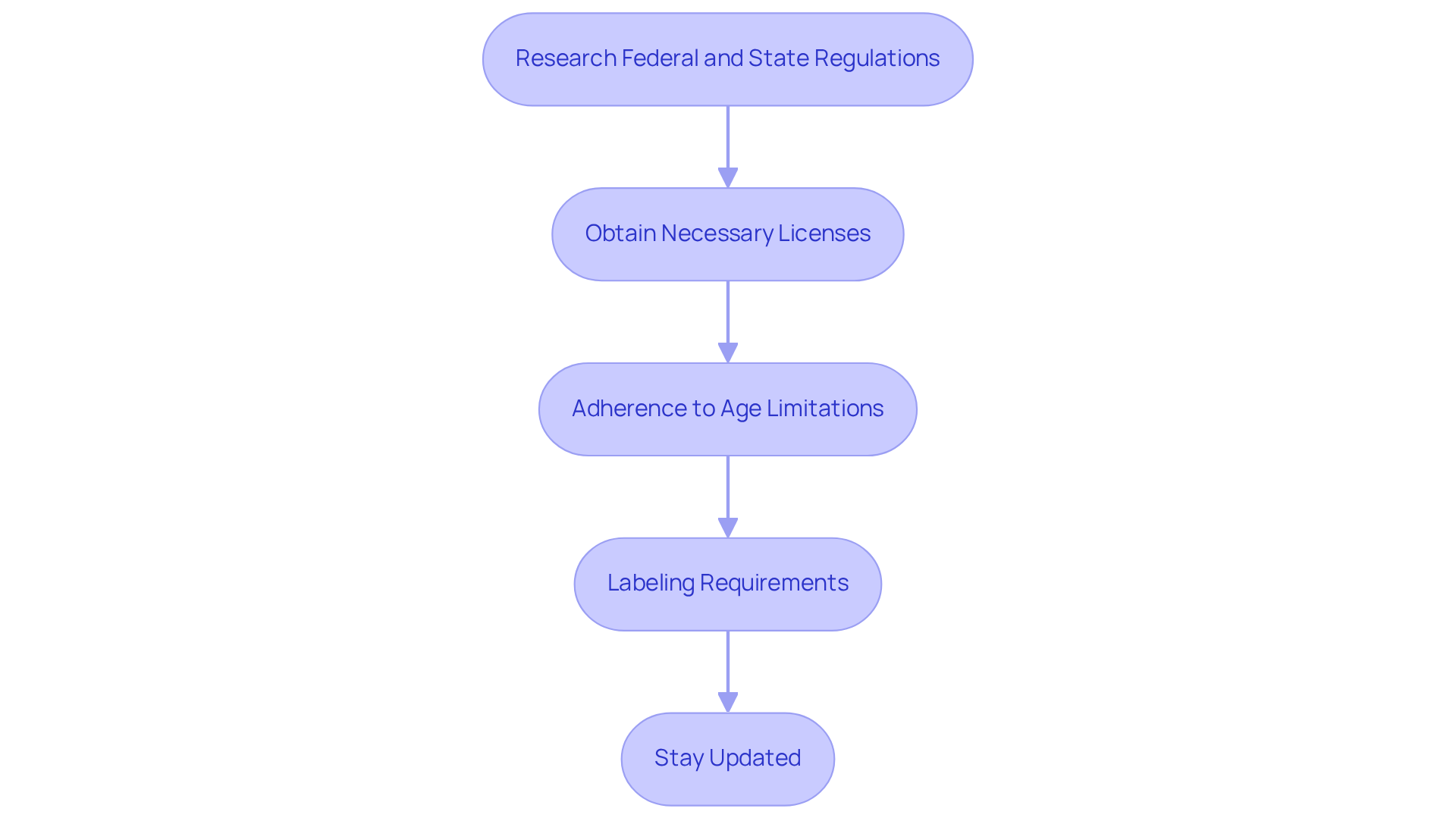
Choose Your Online Wine Business Model
- The Direct-to-Consumer (DTC) model empowers you to sell directly to clients via your website or clubs, which fosters a closer relationship with consumers and can provide insights on how to start a wine business online with potentially higher profit margins. By establishing sustainable DTC channels, you can drive consistent growth and understand how to start a wine business online, transforming casual buyers into loyal club members through proven strategies.
- When learning how to start a wine business online, you can leverage established e-commerce platforms such as Shopify or WineDirect. These platforms offer tools specifically designed for beverage sales, including compliance features and payment processing, which are crucial for those learning how to start a wine business online.
- Subscription Services: Implement a subscription model that allows clients to receive regular deliveries of wine. This approach not only enhances customer loyalty but also provides predictable revenue—essential for maximizing DTC revenue in family-owned wineries.
- Wholesale Distribution: For those aiming to reach a broader audience, consider partnering with distributors or retailers. While this model may involve lower profit margins, it requires the cultivation of strong relationships with distributors to effectively expand your market reach.
- Hybrid Model: By combining DTC and wholesale strategies, you can maximize both reach and revenue. This method allows you to serve direct customers while also engaging retail associates, broadening your revenue sources and enriching your club offerings with engaging brand stories.
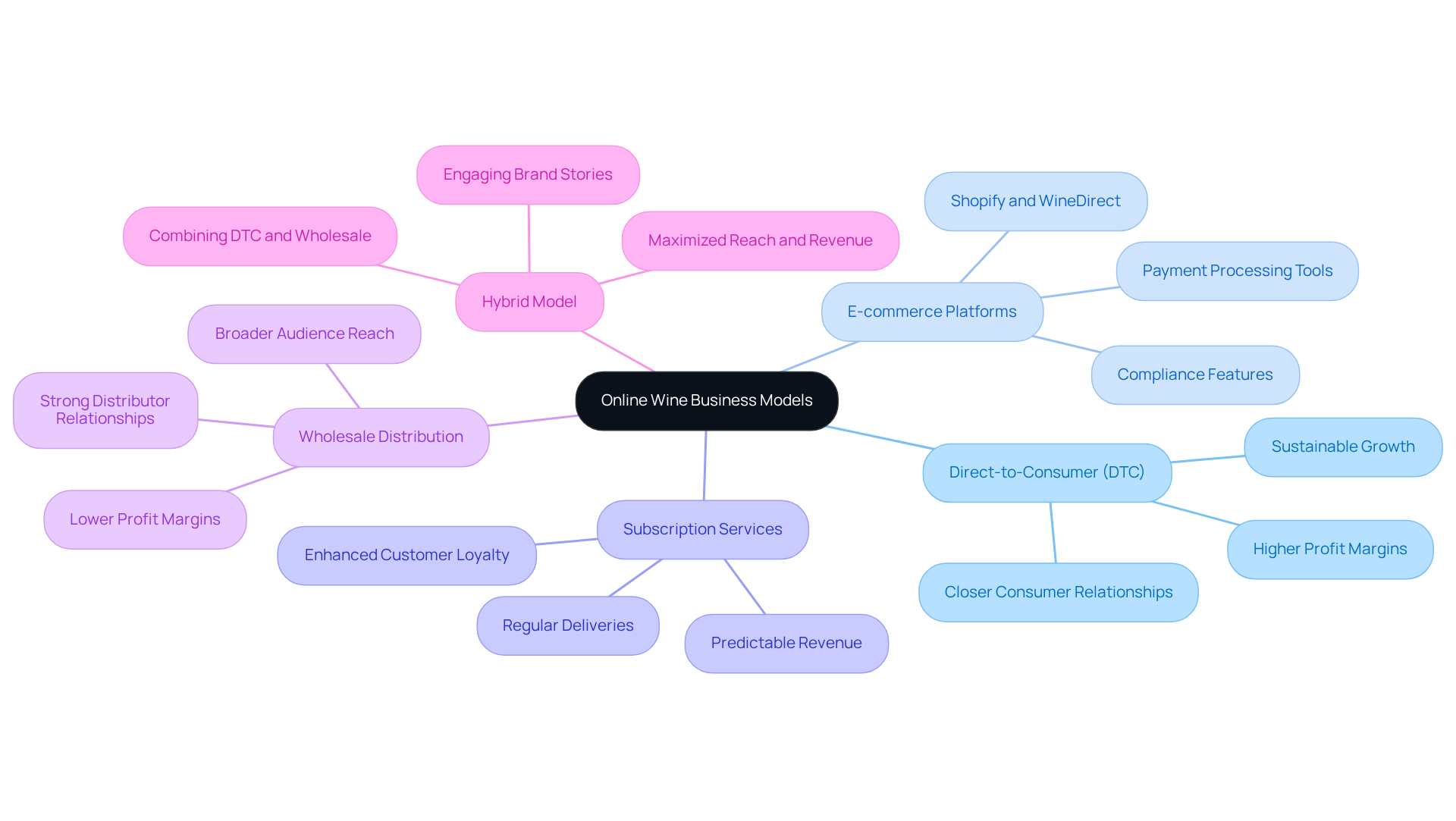
Source Quality Wines and Build Supplier Relationships
- Identify Quality Suppliers: Begin by researching and identifying wineries or distributors renowned for their premium beverages. Engage in beverage expos, tastings, and industry events to forge connections with potential suppliers. Consider how these suppliers can bolster your direct-to-consumer strategies by providing beverages that resonate with your target audience, especially when thinking about how to start a wine business online.
- Negotiate Terms: After identifying potential suppliers, negotiate mutually beneficial terms. This encompasses pricing, delivery schedules, and payment conditions. Ensure that these terms align with your strategic capital planning to optimize cash flow and support growth.
- Establish Quality Control Standards: Implement clear quality standards for the wines you source. This practice guarantees that every bottle meets your brand's expectations and maintains client satisfaction, which is vital for .
- Build Long-Term Relationships: Cultivate robust relationships with your suppliers through consistent communication and collaboration. This approach can lead to improved pricing, exclusive offerings, and enhanced support during peak seasons. Strong supplier connections also enhance your ability to adapt to market fluctuations and evolving customer preferences.
- Diversify Your Offerings: Strategically consider sourcing a diverse array of wines to cater to varying customer preferences. This may include different varietals, regions, and price points to attract a wider audience. Diversification can significantly enhance your direct-to-consumer strategies when considering how to start a wine business online by broadening your appeal.
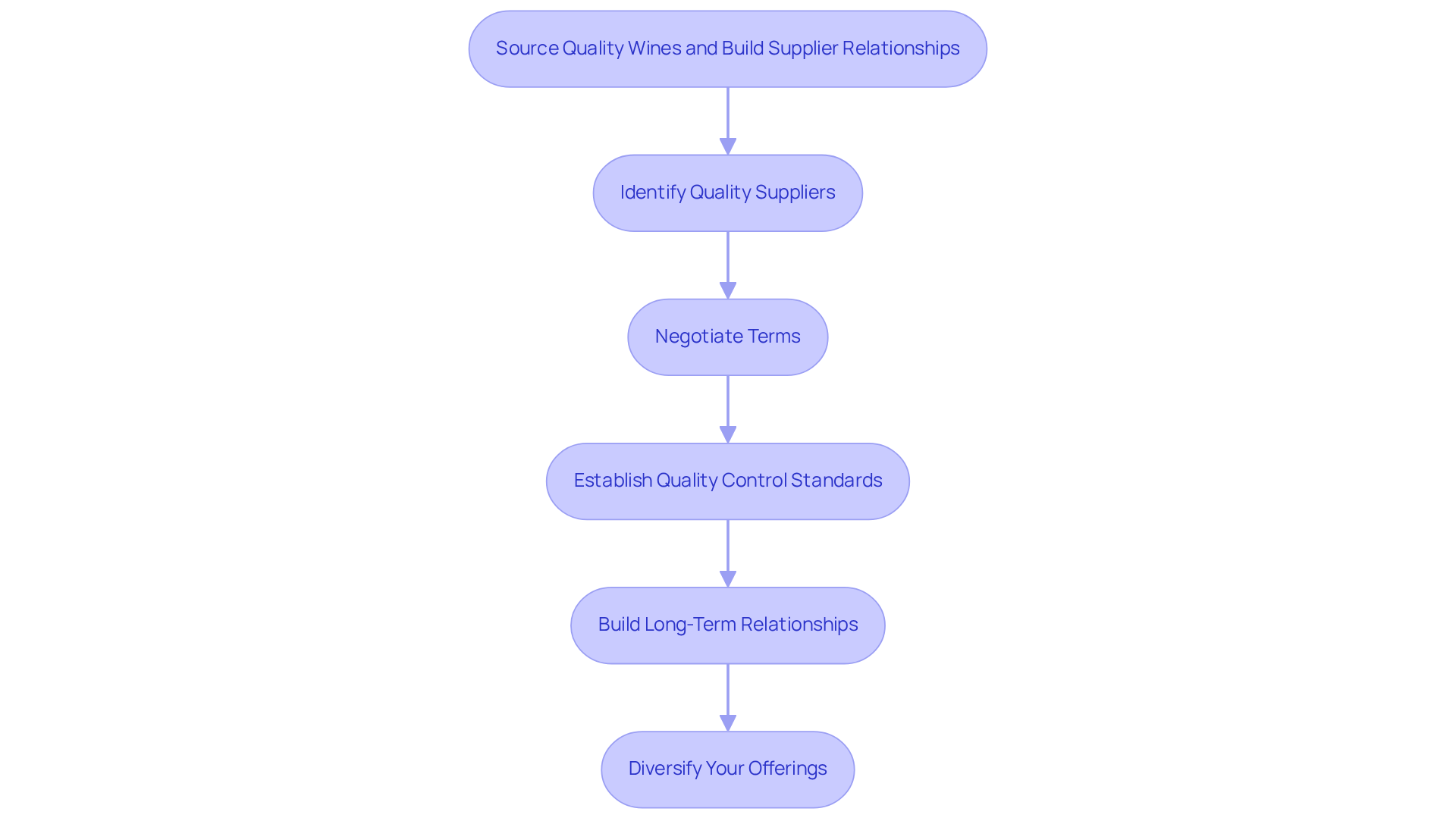
Implement Effective Marketing Strategies
- Establish a Strong Identity: Craft a captivating narrative that resonates with your target audience. This encompasses your logo, packaging, and messaging, all of which should reflect your values and mission. By emphasizing how to start a wine business online that showcases the heritage and uniqueness of your family winery, you can forge deeper connections with consumers, thereby enhancing brand loyalty.
- Leverage Social Media: Harness platforms such as Instagram and Facebook to showcase your wines, share engaging content, and foster connections with your audience. Consider implementing targeted advertisements to reach potential clients effectively. By highlighting your winery's story and values on social media, you can transform casual buyers into dedicated club members.
- Email Marketing: Develop an email list to engage clients through newsletters, promotions, and personalized offers. This strategy not only helps maintain customer relationships but also encourages repeat purchases. Utilize to convey the passion behind your beverages and the family heritage, cultivating a stronger emotional bond with your audience.
- Content Marketing: Produce valuable content related to beverages, including blog posts, videos, and tasting notes. This positions you as an authority in the industry and is essential for understanding how to start a wine business online, attracting organic traffic to your website. Focus on storytelling that reflects your winery's journey and the craftsmanship behind each bottle, thereby enhancing your brand's appeal.
- Host Events and Tastings: Organize virtual tastings, beverage clubs, or local gatherings to connect with patrons directly. This not only promotes your wines but also builds community and loyalty among your customer base. By incorporating your brand story into these events, you create memorable experiences that resonate with attendees, reinforcing their connection to your winery.
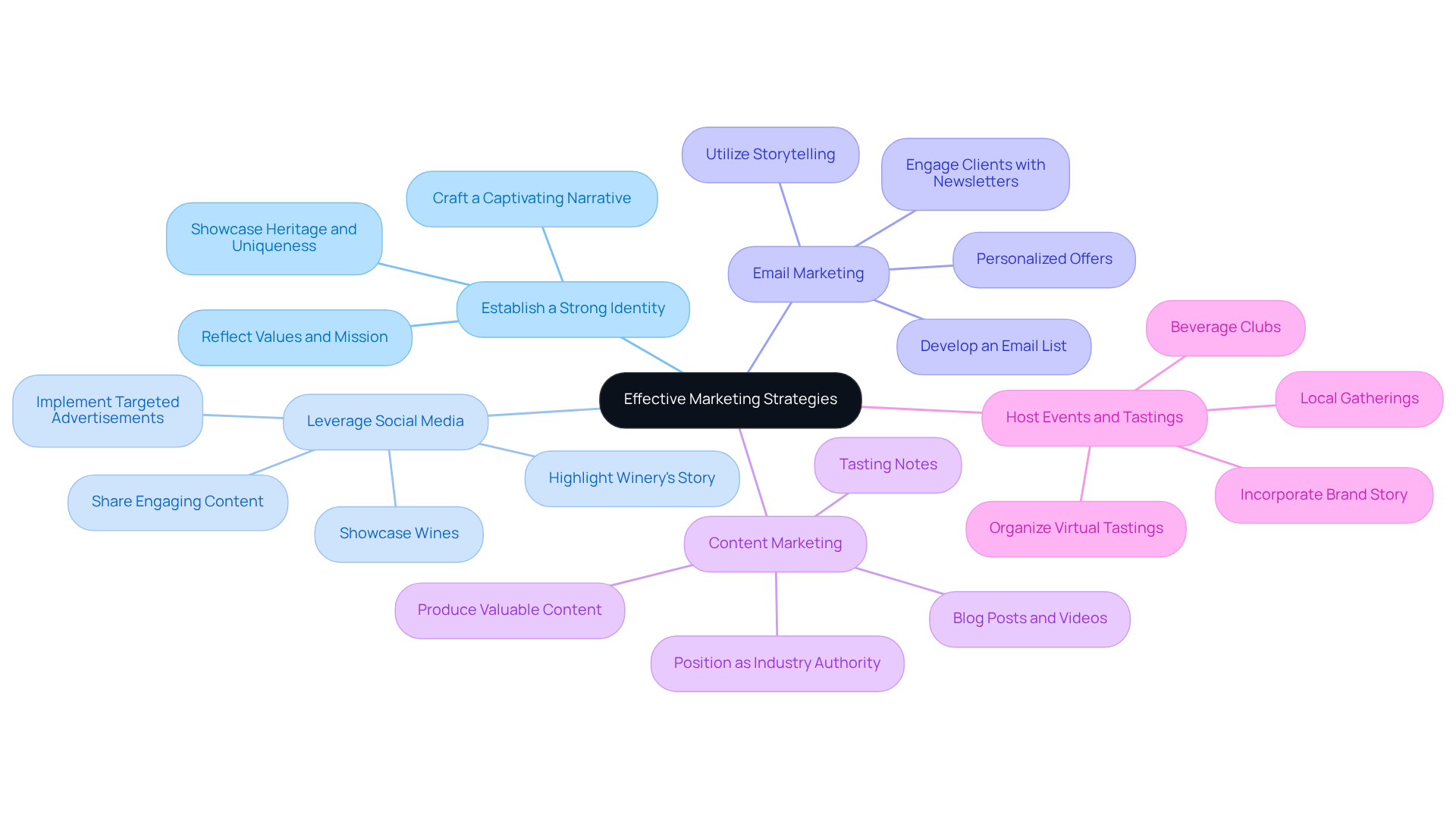
Conclusion
Launching an online wine business demands a strategic approach that encompasses various facets of entrepreneurship. By articulating a clear vision, conducting comprehensive market research, and crafting a detailed business plan, aspiring wine entrepreneurs can establish a robust foundation for success. A thorough understanding of the legal landscape and the selection of an appropriate business model further augment the likelihood of thriving in this competitive market.
Critical insights include:
- The necessity of sourcing quality wines
- Cultivating strong relationships with suppliers, which can profoundly influence product offerings and enhance customer satisfaction
- The implementation of effective marketing strategies—spanning social media engagement to compelling storytelling in email marketing—which can foster a loyal customer base and amplify brand visibility
Each step in this process not only facilitates the launch of the business but also ensures its sustainable growth.
For those eager to embark on this exhilarating journey, the path is replete with opportunities to connect with consumers and convey the passion behind each bottle. By leveraging the strategies outlined, entrepreneurs can adeptly navigate the complexities of the wine industry and forge a brand that resonates with their audience. The wine business transcends mere product sales; it revolves around crafting experiences and nurturing relationships that endure the test of time.
Frequently Asked Questions
What is the first step in developing a comprehensive business plan for a beverage business?
The first step is to define your vision and mission, clearly articulating your objectives and core values to attract like-minded customers.
How can market research benefit a beverage business?
Market research helps uncover trends, identify target demographics, and assess competitors, allowing businesses to refine their business model and marketing strategies for sustainable growth.
What should be considered when outlining a business model for a beverage company?
Consider whether to sell directly to consumers, through retailers, or adopt a hybrid approach, and explore options like wine clubs, subscription services, or e-commerce platforms.
Why are financial projections important for a beverage business?
Financial projections are crucial for understanding startup costs and revenue potential, which can attract potential investors and ensure financial viability.
What elements should be included in a marketing strategy for a beverage business?
A marketing strategy should integrate branding, promotional tactics, and client engagement strategies, leveraging unique narratives to emotionally connect with clients.
What should an operational plan for a beverage business detail?
An operational plan should detail daily operations, including sourcing, production, distribution, and client service, ensuring efficient operations while remaining adaptable.
What federal regulations must be researched when starting a beverage business?
It is important to understand the federal laws governing alcohol sales, particularly those set by the Alcohol and Tobacco Tax and Trade Bureau (TTB), as well as state-specific laws.
What licenses are necessary for a beverage business?
Necessary licenses include a federal basic permit, state liquor licenses, and any local permits, especially if the business model includes direct sales to consumers.
How can a beverage business ensure compliance with age limitations?
Implement robust age verification procedures to ensure that alcoholic beverages are sold only to individuals of legal drinking age.
What labeling requirements must a beverage business adhere to?
A beverage business must comply with labeling laws that require information such as alcohol content, health warnings, and the origin of the product.
Why is it important to stay updated on legal requirements and regulations?
Staying informed about changes in laws and regulations is crucial as they can impact business operations and compliance.




